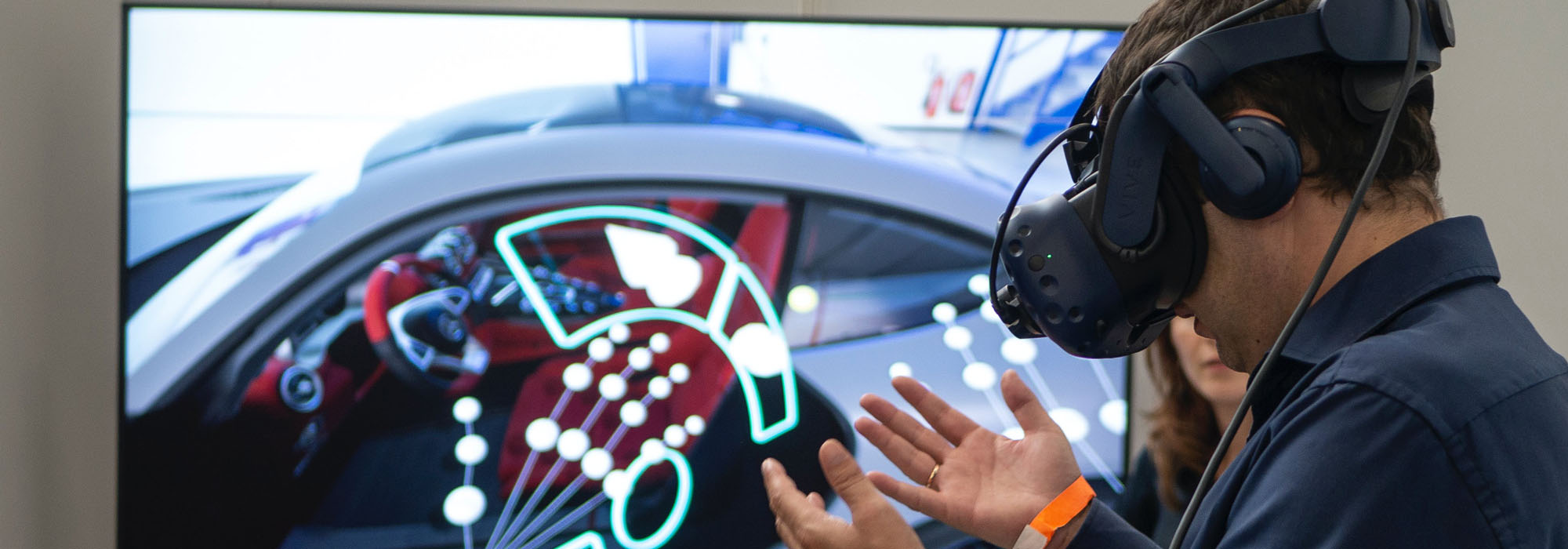Course overview
BA (Hons) Games Art Student Showreel
Take a look at some of the fantastic work from Teesside University London’s MA Animation and Visual Effects, and BA (Hons) Games Art in our Student Showreel.
As a computer game artist, you create a game's characters, assets, environments, creatures and vehicles, as well as producing concept art and storyboards.
At Teesside University London, you develop your practical skills and explore specialised areas including 3D character sculpting, photo-real texturing and surfaces, hard surface modelling, shaders, material, lighting and effects, game engine implementation, concept art, environment art and character art.
- Industry links: take part in Animex, our annual international animation and games festival featuring experts from Rockstar, Pixar, Disney and Sony.
- Real-world experience: enter GameJam events, take part in industry competitions and Beta test upcoming games before they’re released.
- Career-ready: our ExpoSeries allows you to showcase your skills to industry professionals who are looking to recruit new and rising talent.
- Start-up business support: we support you to develop your own business in games through our Power UP Indie Games Accelerator
Course details
Course structure
Year 1 core modules
You create computer-generated 3D models using a range of techniques. Learn how to apply materials, textures, lighting and rendering to your finished models.
It is important to communicate ideas visually when on a creative journey in visual media. Study the entire preproduction pipeline, from fundamental drawing skills through to generating ideas, design concepts and storyboarding.
It’s important to understand the principles of motion for anyone entering the computer graphics industry. Learn how to apply the basic laws of physics to create convincing movement in 3D and creative application of motion principles. Create a portfolio of short, animated shots with 3D rigs using industry standard animation software.?
You learn how to develop technical art solutions by producing dynamic and engaging immersive content, importing assets and creating scenes. Gain a deeper understanding of more advanced engine editor tools, integrating assets, visual effects and animation.
Develop your skills in lighting, particle effects, post-processing, advanced node-based material shaders and integration of dynamic effects and events using visual scripting. Integrate games art and animation into a game level using an industry standard game engine.
Year 2 core modules
Explore the use of sculpting software to create digital assets. Learn how to create anatomically accurate characters and creatures. Using relevant sculpting techniques, create digital assets for a range of potential scenarios and themes, from high-end visual effects to AAA games.
You develop a product or service as part of an enterprise project for a real client – they set the brief based on their organisation’s strategic needs. Working in small teams, you determine the project aims, objectives, roles, tasks, deliverables, schedules and documentation. You then pitch your project to the client.
You are introduced to the processes behind the research, design and construction of real-time assets within a contemporary game engine. Cover techniques for 3D modelling and texturing, considering compilation, set design and lighting.
Study procedural tools and techniques within the games, animation and visual effects pipelines, learning how they can be developed or employed to increase consistency, productivity and efficiency.
You create and present a procedural tool or procedurally generated output that fits in to the games, animation and visual effects pipeline.
Optional work placement year (applicable to students starting their course from September 2025)
You have the option to spend one year in industry learning and developing your skills. We encourage and support you with applying for a placement, job hunting and networking.
You gain experience favoured by graduate recruiters and develop your technical skillset. You also obtain the transferable skills required in any professional environment, including communication, negotiation, teamwork, leadership, organisation, confidence, self-reliance, problem-solving, being able to work under pressure, and commercial awareness.
Many employers view a placement as a year-long interview, therefore placements are increasingly becoming an essential part of an organisation's pre-selection strategy in their graduate recruitment process. Benefits include:
· improved job prospects
· enhanced employment skills and improved career progression opportunities
· a higher starting salary than your full-time counterparts
· a better degree classification
· a richer CV
· a year's salary before completing your degree
· experience of workplace culture
· the opportunity to design and base your final-year project within a working environment.
If you are unable to secure a work placement with an employer, then you simply continue on a course without the work placement.
Final-year core modules
Work as part of a games development team that is as close to industrial practice as possible. Simulate the working criteria and mix of development skills needed to produce a polished prototype of a computer game concept which would be suitable for publication.
Games art is an ever-expanding field, with new forms of graphical representations being developed to explore and heighten graphical quality and believability.
This module introduces you to the emerging fields and technologies that improve graphical representation, for further realism or from a pipeline point of view. Explore a range of technology and techniques, and how to use these to increase the quality of work for audiences.
Put your skills into practice, designing and creating a game asset that incorporates new or emerging technology. Produce a report or presentation on a company in the field, evaluating how they engage with and respond to global, ethical and social factors, and inclusion in an evolving marketplace.
Design, research and complete your own project to develop the current practice, products or service of a client or your own organisation.
Carry out research to validate your hypotheses, test solutions, build prototypes, and make conclusions. Your area of research and practice is defined by the client or organisation. You must ensure that what you’re doing adds value and delivers against the brief. You work independently with support from a supervisor.
Modules offered may vary.
How you learn
You learn in group sessions that focus on practical skills supported by the academic concepts and theories. Which means you can discuss and develop your understanding of topics covered in smaller groups.
Your learning experiences are strengthened by sessions delivered by industry practitioners who share their valuable industry insights with you.
You also develop your teamworking skills, working with games designers in a simulated game studio experience, outsourcing various essentials such as assets and animation to specialist teams. You work on games using the latest technologies, such as Unreal 5 and Unity, as used in industry.
Subject (or modules) are delivered in six-week blocks. You study one at a time, supported by online learning materials.
How you are assessed
It’s essential that you learn by doing. Which means that most of your assessed work is based around practical projects that you work on throughout. You get valuable tutor feedback to guide your work and your overall development.
As you progress through the course, you develop a portfolio of work - this is an important industry requirement. Our tutors can give you advice and guidance on which work to include.
And your final project allows you the freedom to set your own brief based on your skills, interests and career aspirations.
Our Disability Services team provide an inclusive and empowering learning environment and have specialist staff to support disabled students access any additional tailored resources needed. If you have a specific learning difficulty, mental health condition, autism, sensory impairment, chronic health condition or any other disability please contact a Disability Services as early as possible.
Find out more about our disability services
Find out more about financial support
Find out more about our course related costs
Entry requirements
Entry requirements
A typical offer is 96-112 tariff points from at least two A levels (or equivalent). Find out how many points your qualifications are worth using the UCAS tariff calculator.
You must also provide a portfolio if you haven’t previously studied art, design, drawing, animation, games art or games design. Your portfolio should demonstrate fundamental drawing skills such as life drawing and observational drawing, and show your creativity through your own design ideas.
We welcome applications from mature students without conventional entry requirements. We take into account any short courses you have studied with us, such as our Winter and Summer University, any alternative qualifications or other experience you may have.
International applicants
International applicants can find out what qualifications they need by visiting Your Country
What you need
To access the on-campus facilities you need a HTML5-capable web browser on a computer such as a Windows, Mac, Chromebook, or Linux computer. HTML5-capable web browsers that can be used include the following:
- Google Chrome
- Mozilla Firefox
- Safari
- Microsoft Edge
For some sessions you can also access sessions on the following browsers and devices:
- Chrome or Safari on an iPad (iOS 11 or later)
- Android (Android 8 or later)
- Microsoft Surface Pro (Windows 10) tablet
Don't have your own device yet?
Don't worry - we have a bank of devices available for you to loan whenever you are on campus.
Our Digital Access Fund could also help with a £400 John Smith's Student Store voucher to buy a laptop or digital device, and access to Adobe Creative Cloud - a suite of 20+ world-class, industry-standard creative apps including Photoshop and InDesign. Subject to eligibility criteria. Terms and conditions apply.
Teesside University London Digital Access Fund Scheme Terms and Conditions 2023-24
Employability
Career opportunities
Teesside University graduates have gone on to work as artists, level designers, 3D modellers and texture artists at a range of games companies including 3rd Dimensions, Atomic Planet, Bizarre Creations, Creative Assembly, Electronic Arts, Eutechnyx, Halch, Media Molecule, Microsoft Rare, Naughty Dog, Ninja Theory, Rebellion, Rockstar North and Rockstar San Diego, Sega, Sony, Streamline, Supermassive Games, Traveller's Tales, Ubisoft, Venom, Weta Digital and so many more.
You develop skills for a career in digital media – typically in film, TV, advertising and multimedia – through to architectural and product visualisation.
And we have excellent relationships with businesses, giving you the opportunity to apply for internships and graduate positions with key organisations such as Microsoft, Rare, Team 17, ZeroLight, R8 Games, Hammerhead VR, Dojo Arcade, Schlumberger, Sumo Digital and Coastsink.
Information for international applicants
Qualifications
International applicants - find out what qualifications you need by selecting your country below.
Select your country:
Useful information
Visit our international pages for useful information for non-UK students and applicants.


